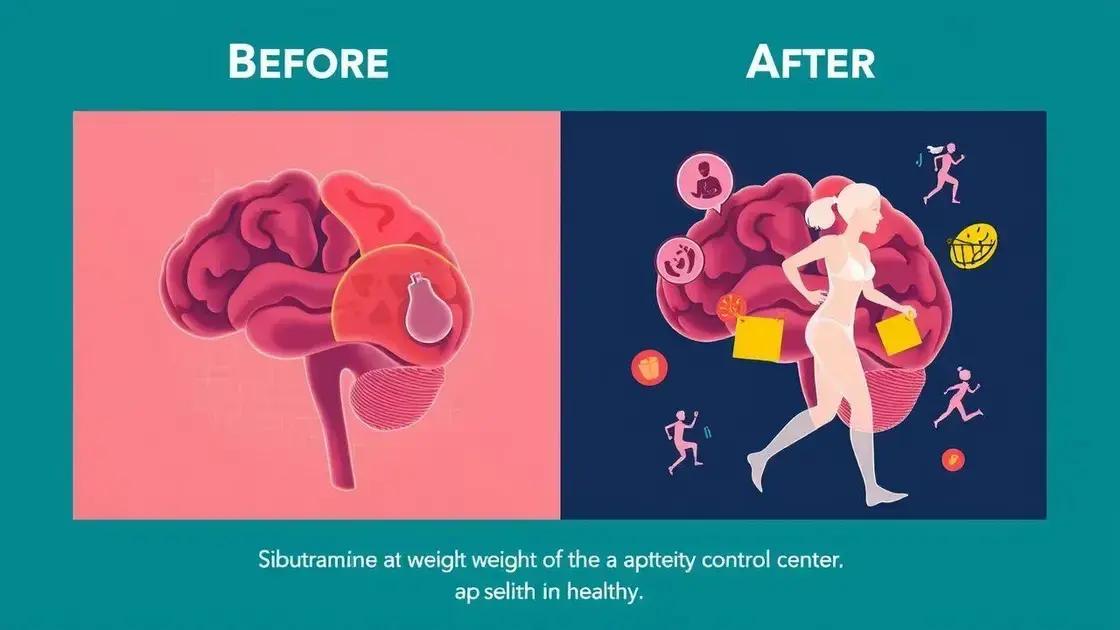Sibutramine is a prescription weight management medication that works by affecting brain neurotransmitters to control appetite and increase satiety, showing significant results when combined with lifestyle changes and proper medical supervision, particularly effective for individuals with a BMI of 30 or higher.
Sibutramine has been a hot topic in the weight loss community for a while now. Its promises can be enticing, but what’s the real story behind it? Are the benefits as significant as they seem? Let’s dive into the details and uncover the truth.
What Exactly is Sibutramine?
Sibutramine is a prescription medication originally developed to treat obesity and help with weight management. It belongs to a class of drugs known as appetite suppressants or anorexiants, which work by affecting certain neurotransmitters in the brain.
Chemical Structure and Classification
The medication works primarily by blocking the reuptake of serotonin and norepinephrine in the brain, two key neurotransmitters involved in appetite regulation and mood control. This mechanism helps create a feeling of fullness and satisfaction with smaller portions of food.
Historical Background
First introduced in the late 1990s, Sibutramine gained popularity as a weight loss aid under various brand names. It was prescribed to patients with a body mass index (BMI) of 30 or higher, or those with a BMI of 27 plus other weight-related health conditions.
Formulation and Dosage
The medication typically comes in capsule form, with different strength options available based on individual needs and medical supervision. It’s designed to be part of a comprehensive weight management program that includes proper diet and regular exercise.
Understanding how Sibutramine works in the body is crucial for anyone considering it as part of their weight loss journey. While it can be an effective tool, it’s important to note that it requires proper medical oversight and careful consideration of individual health factors.
How Does Sibutramine Affect Weight Loss?

Sibutramine influences weight loss through multiple mechanisms in the body, primarily targeting the brain’s appetite control centers. Its dual action helps people achieve their weight loss goals through two main pathways.
Appetite Control Mechanism
The medication works by increasing the levels of serotonin and norepinephrine in the brain, which helps you feel fuller for longer periods. This natural appetite suppression makes it easier to stick to a reduced-calorie diet without feeling constantly hungry.
Metabolic Effects
Beyond appetite control, Sibutramine may also influence your body’s energy expenditure. Some studies suggest it can slightly increase the number of calories burned throughout the day, supporting the weight loss process through enhanced metabolism.
Eating Behavior Changes
Users often report feeling more in control of their eating habits while taking Sibutramine. The medication can help reduce cravings for high-calorie foods and decrease the urge to snack between meals, making it easier to maintain a structured eating plan.
Synergy with Lifestyle Changes
The medication works best when combined with healthy lifestyle modifications. Regular physical activity and a balanced diet can enhance its effectiveness, creating a comprehensive approach to weight management. The feeling of satiety provided by Sibutramine makes it easier to maintain these positive lifestyle changes.
Scientific Evidence Behind Sibutramine
Research has shown that Sibutramine can be effective for weight management when used as directed. Multiple clinical trials have demonstrated its potential benefits for individuals struggling with weight loss.
Key Clinical Studies
A landmark study published in the New England Journal of Medicine followed participants for one year and found that those taking Sibutramine lost an average of 5-10% of their initial body weight. This was significantly more than the placebo group when combined with lifestyle modifications.
Meta-Analysis Results
Comprehensive reviews of multiple studies have supported these findings. Research data shows that Sibutramine can help achieve meaningful weight loss results, particularly when part of a structured weight management program that includes proper diet and exercise.
Mechanism Validation
Scientific studies have confirmed the medication’s effects on neurotransmitters, validating its dual action on appetite control and metabolism. Brain imaging studies have shown how Sibutramine influences the areas responsible for hunger and satiety signals.
Long-term Effectiveness
Research tracking patients over extended periods has provided insights into the medication’s sustained effects. Studies indicate that consistent use, along with lifestyle changes, can help maintain weight loss results. However, individual responses may vary, and results are most successful when the medication is used as part of a comprehensive weight management approach.
Population Studies
Research across different demographic groups has helped identify which individuals might benefit most from Sibutramine treatment. These studies have been valuable in developing guidelines for healthcare providers to optimize treatment outcomes.
Potential Side Effects and Risks

Like any medication, Sibutramine may cause certain side effects that users should be aware of. Understanding these potential effects helps in making informed decisions about weight management options.
Common Side Effects
Some users may experience mild side effects while taking Sibutramine, including:
- Dry mouth and mild thirst
- Changes in sleep patterns
- Temporary changes in appetite
- Mild headaches
- Occasional constipation
Cardiovascular Considerations
Regular monitoring of blood pressure and heart rate is important while using Sibutramine. Healthcare providers typically conduct routine check-ups to ensure safe and effective use of the medication.
Who Should Exercise Caution
Certain groups should consult closely with their healthcare provider before using Sibutramine, including:
- People with pre-existing heart conditions
- Those with high blood pressure
- Individuals taking certain medications
- People with specific medical conditions
Monitoring and Management
Healthcare providers typically schedule regular check-ups to monitor progress and adjust treatment as needed. This helps ensure the medication is working effectively while minimizing any potential risks.
Lifestyle Considerations
Maintaining a balanced diet and regular exercise routine while taking Sibutramine can help optimize results and minimize potential side effects. Staying well-hydrated and following prescribed guidelines is also important.
Real-life Experiences of Women Over 30
Women over 30 who have used Sibutramine as part of their weight management journey have shared various experiences that provide valuable insights into real-world results.
Sarah’s Journey: A Working Mom’s Experience
Sarah, 35, a mother of two, reported that Sibutramine helped her manage portion control while juggling her busy schedule. She noticed significant changes in her eating habits within the first few weeks and achieved her weight loss goals over six months.
Professional Women’s Perspectives
Many career-focused women in their 30s and 40s have shared how the medication helped them maintain energy levels while reducing their food intake. They particularly appreciated how it helped them resist stress-related eating during demanding workdays.
Lifestyle Integration Stories
Users consistently report that Sibutramine worked best when combined with regular exercise and healthy eating habits. Many women found it easier to stick to their fitness routines as they felt more energetic and motivated throughout their weight loss journey.
Long-term Success Stories
Jennifer, 42, shared how she maintained her results by developing better eating habits while using Sibutramine. She emphasized the importance of working closely with her healthcare provider to monitor progress and adjust her program as needed.
Support System Benefits
Many women found success by combining medication with support groups and regular check-ins with their healthcare providers. This comprehensive approach helped them stay accountable and motivated throughout their weight loss journey.
Final Verdict: Worth Trying or Not?

When considering Sibutramine as a weight management option, it’s important to evaluate several key factors that can help determine if it’s right for you.
Effectiveness Factors
Research and real-world experiences suggest that Sibutramine can be effective when used as part of a comprehensive weight management program. The medication has shown promising results, particularly when combined with lifestyle changes and proper medical supervision.
Who May Benefit Most
The medication appears most effective for:
- Adults with a BMI of 30 or higher
- People who haven’t achieved desired results with diet and exercise alone
- Those who can commit to regular medical monitoring
- Individuals ready to make lifestyle changes
Important Considerations
Before starting Sibutramine, consider these key points:
- Regular medical check-ups are essential
- Results vary from person to person
- Lifestyle changes enhance effectiveness
- Cost and availability factors
Making an Informed Decision
The decision to try Sibutramine should be made in consultation with a healthcare provider who can evaluate your specific situation, medical history, and weight loss goals. They can help determine if this medication aligns with your needs and health profile.
Making an Informed Decision About Sibutramine for Weight Loss
Sibutramine represents an option for those seeking support in their weight management journey. When used as part of a comprehensive approach that includes proper diet, regular exercise, and medical supervision, it can contribute to achieving weight loss goals.
The key to success lies in understanding both the benefits and responsibilities that come with using this medication. Regular check-ups, lifestyle modifications, and realistic expectations are essential components of a successful weight management program.
Remember that weight loss is a personal journey, and what works best for one person may differ for another. Consulting with healthcare providers and following their guidance can help determine if Sibutramine is the right choice for your individual circumstances and weight management goals.
By taking an informed and balanced approach, and working closely with healthcare professionals, you can make the best decision for your weight management journey and overall health objectives.
Common Questions About Sibutramine for Weight Management
How long does it typically take to see results with Sibutramine?
Most users report noticing changes in their appetite and eating habits within the first few weeks. However, significant weight loss results typically become visible after 4-6 weeks of consistent use combined with proper diet and exercise.
Can I take Sibutramine while following my regular exercise routine?
Yes, Sibutramine works well alongside regular exercise. In fact, maintaining physical activity can enhance your results. Just ensure you stay well-hydrated and listen to your body’s signals during workouts.
Will I regain weight after stopping Sibutramine?
The key to maintaining results is developing healthy habits while using Sibutramine. When combined with sustainable lifestyle changes and proper nutrition, the healthy habits you develop can help maintain your progress.
How often do I need medical check-ups while using Sibutramine?
Regular monitoring is important for optimal results. Most healthcare providers recommend monthly check-ups initially, then quarterly visits once progress is stable. This ensures safe and effective use of the medication.
Can Sibutramine help with emotional eating?
Yes, Sibutramine can help manage emotional eating by affecting neurotransmitters that influence appetite and satiety. This can make it easier to maintain control over eating habits, especially during stressful periods.
Is Sibutramine suitable for everyone trying to lose weight?
Sibutramine is most effective for individuals with a BMI of 30 or higher, or those with a BMI of 27 plus weight-related health conditions. A healthcare provider can determine if it’s appropriate for your specific situation.
